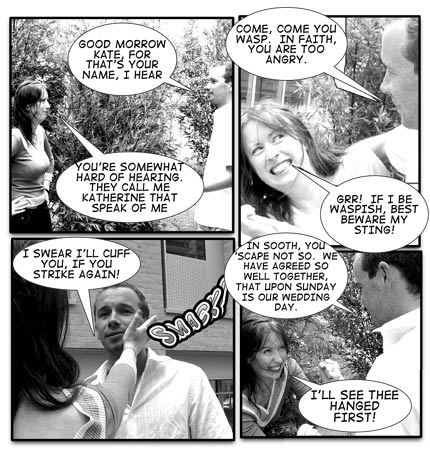
Answering Russell’s response to my earlier post:
I guess it’s about getting the emphasis right, Russell. To say, as Frye does, that literature is “primarily” centripetal is not to say that it is exclusively centripetal. Frye himself regularly makes the point Greenblatt does in Hamlet in Purgatory: that an understanding of the external “referents” in any given work of literature can only deepen our appreciation of it. However, that’s about where agreement between them ends. Frye’s reading scenario is usually laid out something like this: as readers we are confronted with a work of literature with lots of hard words to be looked up and unfamiliar allusions to be traced back to their source, not to mention a contemporary intellectual milieu to be absorbed. And, of course, it’s a good thing we make the necessary effort to do that; it is certainly an integral part of literary scholarship, as Frye invariably points out. But once we have done all of that, we are still confronted with a work of literature that must be interpreted as such because, as Frye says in The Educated Imagination, literature does not reflect reality, it swallows it. And, as he says in Anatomy, once an ideology is taken into a work of literature, it is no longer ideological in reference, it is literary.
Both of the Shakespeare plays you cite, Hamlet and The Taming of the Shrew, provide excellent opportunities to demonstrate how this works. While it is true, for example, that our appreciation of the afterlife misery of Hamlet’s father’s ghost is enhanced by an understanding of the theological conceptions of the afterlife at the time, it’s pretty clear that no audience of Hamlet requires anything approaching a scholarly knowledge of such a thing. The archetype of the dread surrounding death is more than sufficient to communicate to us what is happening at the elemental level of understanding. Death is terrifying, the afterlife a nausea-inducing mystery. “To be or not to be…” Nuff said.
The same goes with The Taming of the Shrew. We don’t, as you say, have to live in a “ideal world” to see that the normative misogyny of the world of the play is ugly and absurd. The play itself shows us that! One of the things that makes Taming of the Shrew remarkable — and, of course, entirely consistent with the canon as a whole — is its pronounced metaliterary perspective. In this case, it mostly takes the form (like A Midsummer Night’s Dream) of a dramatically superfluous fifth act. That is to say, the standard New Comedy plot is long since resolved by the time of the wedding banquet where Katherine gives her notorious speech in which she entreats the women present to submit themselves to their husbands, even to the point of exhorting them to “place your hands beneath your husband’s foot.” But this little pantomime is no more than that: it’s a fully self-aware show that Petruchio and Katherine are putting on for the benefit (or is it at the expense?) of their less imaginitively adept peers. We in the audience proper know better. We know that by this point Katherine and Petruchio have successfully (albeit with a tremendous amount of rough and tumble) negotiated together a world of play where nothing is quite what it seems — where the sun may be the moon or vice versa, and an old man encountered on the road to Padua may be mistaken for a “young budding virgin” — or, more accurately (and much more interestingly) be pretended to be mistaken for one. Do I also have to mention the Christopher Sly framing device that gives the play an absolutely explicit metaliterary dimension? The ironies of the fifth act are so rich and evocative that any attempt to reduce them to a flatly declarative ideological intent, however good those intentions, is demonstrably contrary to the inner workings of the play itself.
Here’s my point. I know that many can and do dispute such a reading of the play. However, it is also undeniable that this reading is at least possible with reference to what goes on within the play and without reference to any ideological anxiety beyond it. We are, of course, not compelled to see the play in these terms; but we are free to do so on very good authority (that is, the centripetal focus of the play as such), and that is always Frye’s point. All of our limits, when it comes to literature, are self-imposed. As Merv Nicholson might say, “what makes Frye different” is the articulation of the possibility that we might voluntarily recognize those self-imposed limitations and stroll happily and unencumbered right past them.
